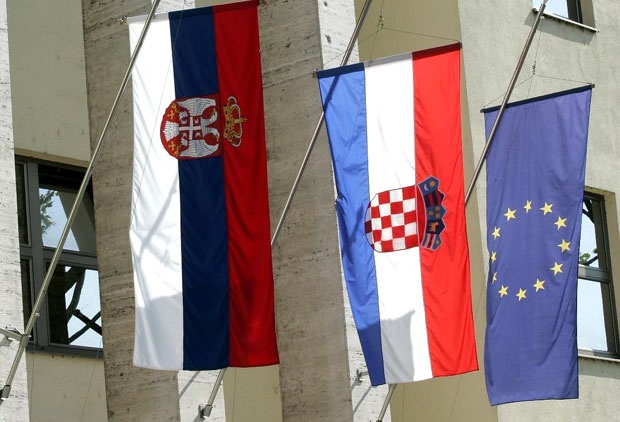The Serbian proverb reflecting a wish for the the neighbour’s cow to die (“Da komšiji crkne krava…“) might be rephrased in the context of Serbia’s EU integration as “let the neighbour’s cluster fail.”
While some of the EU’s most influential countries, such as France, Germany, and Italy, along with the European Commission, have supported the opening of Cluster 3 in negotiations with Serbia, two neighbouring countries—Croatia and Bulgaria—alongside the Netherlands, Sweden, Finland, and the three Baltic states, have opposed it during an EU ambassadors’ meeting.
However, neighbourly relations aren’t entirely antagonistic. Hungary, holding the EU presidency, has been making efforts to convince member states to allow Serbia to open Cluster 3. Hungary has convened three ambassadorial meetings for this purpose and announced plans for a fourth after earlier failures.
Objections from opposing countries
The main objections from countries blocking Cluster 3’s opening include Serbia’s lack of alignment with EU foreign policy and sanctions against Russia, its ambiguous geopolitical positioning, unresolved issues with Kosovo, and concerns over the rule of law and media freedom.
The resistance from Baltic states, Finland, Sweden, and the Netherlands was predictable due to their “hardline” stance on Russia. These nations, critical of Serbia’s refusal to impose sanctions on Moscow and its continued cooperation with Russia during the Ukraine war, have maintained consistent positions. However, the opposition from official Zagreb and Sofia has surprised many.
Historical tensions and current surprises
While Serbia does have a history of tense relations with Croatia and Bulgaria, these issues were thought to have been resolved. Currently, no major disputes dominate relations between Belgrade and either Zagreb or Sofia. Serbian President Aleksandar Vučić commented: “If God himself asked me what wrong we’ve done to the Bulgarians, I wouldn’t know what to say or explain. As for the Croats, I understand everything; it’s not hard to figure that out.”
There has been no official explanation from Zagreb or Sofia beyond the general criticisms voiced by Tonino Picula, a Croatian MEP and European Parliament rapporteur for Serbia. Picula, whose appointment sparked controversy in Serbia, stated that Serbia could overcome its stagnation on the European path with “greater alignment with EU foreign and security policies.”
Picula emphasised that candidate countries like Serbia must align with key EU parameters, suggesting that geopolitical shifts, particularly after Russia’s invasion of Ukraine, have driven recent EU enlargement momentum more than efforts by the candidate countries themselves.
Using Brussels to resolve bilateral disputes
Croatia and Bulgaria may also be leveraging the EU accession process to address unresolved bilateral issues. For instance, Croatia recently sent Montenegro a non-paper outlining disputes it wishes to resolve, such as ownership of the training ship Jadran, border demarcations, and the naming of a sports pool in Kotor, which Croatia claims honours a war crimes suspect from the Dubrovnik conflict.
Similarly, Bulgaria has voiced concerns about Serbia’s treatment of its Bulgarian minority, with President Rumen Radev previously indicating that support for Serbia’s EU path would be reconsidered. Bulgaria has blocked Serbia’s accession progress three times since 2017.
The role of other actors
The new EU Commissioner for Enlargement, Marta Kos from Slovenia, has also supported opening Cluster 3. She noted that bilateral disputes should be kept out of the negotiation process, but acknowledged this has not been fully achieved. She highlighted the historical and psychological complexities of such issues:
“When history is involved, it’s not just about rationality; it’s about emotions and psychology.”
Domestic politics and wider implications
Legal expert Milan Antonijević suggests that Croatia’s earlier complaints about the treatment of its minority in Serbia no longer hold, as evidenced by Tomislav Žigmanov, a representative of the Croatian minority, serving as Serbia’s Minister for Human and Minority Rights. However, Antonijević believes Croatia’s position could be influenced by its upcoming presidential elections, where nationalistic rhetoric might appeal to certain voters.
Similarly, Bulgaria’s stance could partly reflect its domestic political considerations. Antonijević is hopeful that EU solidarity and pressure from influential members like Germany and France might soften the positions of Croatia and Bulgaria.
The importance of self-reflection
Bojana Selaković, Coordinator of the National Convention on the EU, argues that Serbia shares some blame for its stalled EU integration. She notes that Serbia’s foreign policy alignment with the EU stands at just 51%, with significant divergences from EU positions. Selaković also criticised Serbia’s symbolic failure to demonstrate loyalty to the EU amidst shifting geopolitical circumstances, such as high-level meetings with Russian officials while Serbia’s leadership engaged with EU representatives.
Selaković further pointed out that Serbia’s challenges go beyond Kosovo recognition or sanctions on Russia. She argued that even if Serbia met these conditions, its path to EU membership would still hinge on politically unpopular but necessary reforms.
In conclusion, Serbia’s EU journey is hindered by both external and internal obstacles. Neighbouring countries may use their leverage to resolve bilateral disputes, but Serbia also faces significant challenges in aligning its policies with EU standards and implementing crucial reforms.
(NIN, 08.12.2024)
https://www.nin.rs/politika/vesti/63350/da-komsiji-crkne-klaster-zasto-hrvatska-i-bugarska-blokiraju-put-srbije-ka-eu
This post is also available in: Italiano
Source link : http://www.bing.com/news/apiclick.aspx?ref=FexRss&aid=&tid=6756eb3663884e17bc908d02becbe95c&url=https%3A%2F%2Fwww.serbianmonitor.com%2Fen%2Fwhy-are-croatia-and-bulgaria-blocking-serbias-path-to-the-eu%2F&c=5520416780780041940&mkt=de-de
Author :
Publish date : 2024-12-09 01:34:00
Copyright for syndicated content belongs to the linked Source.
